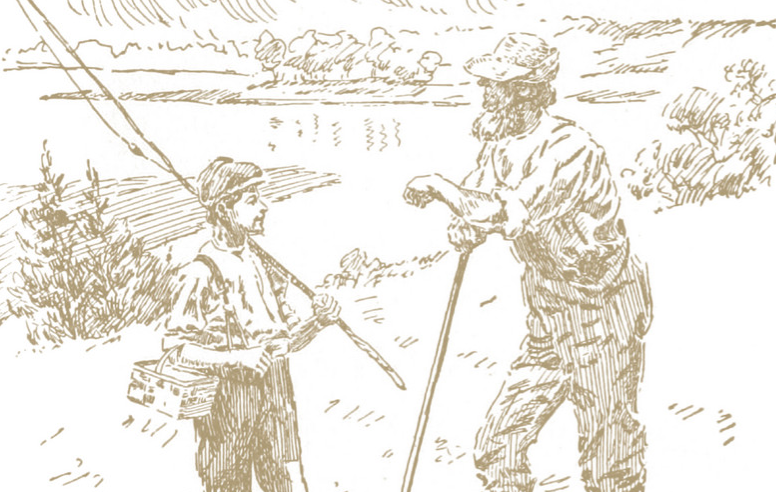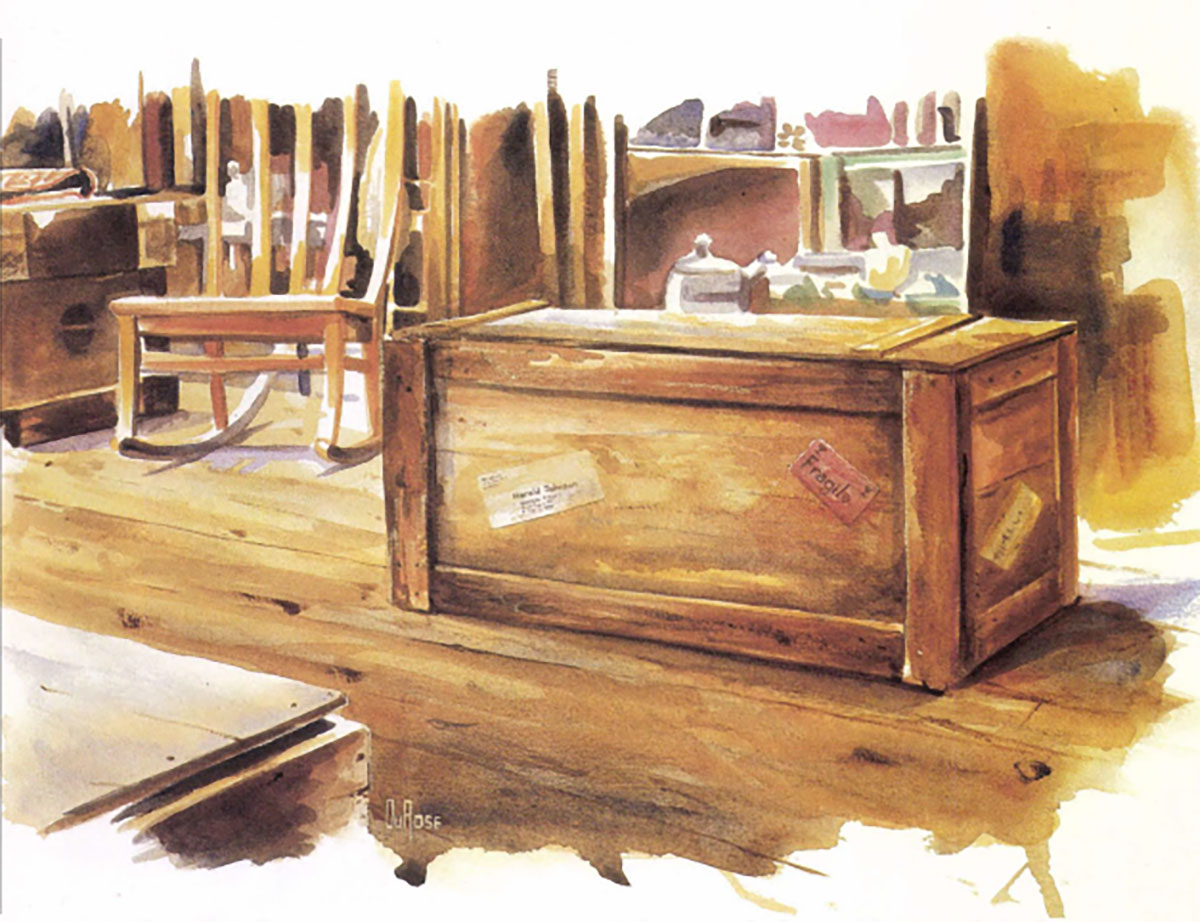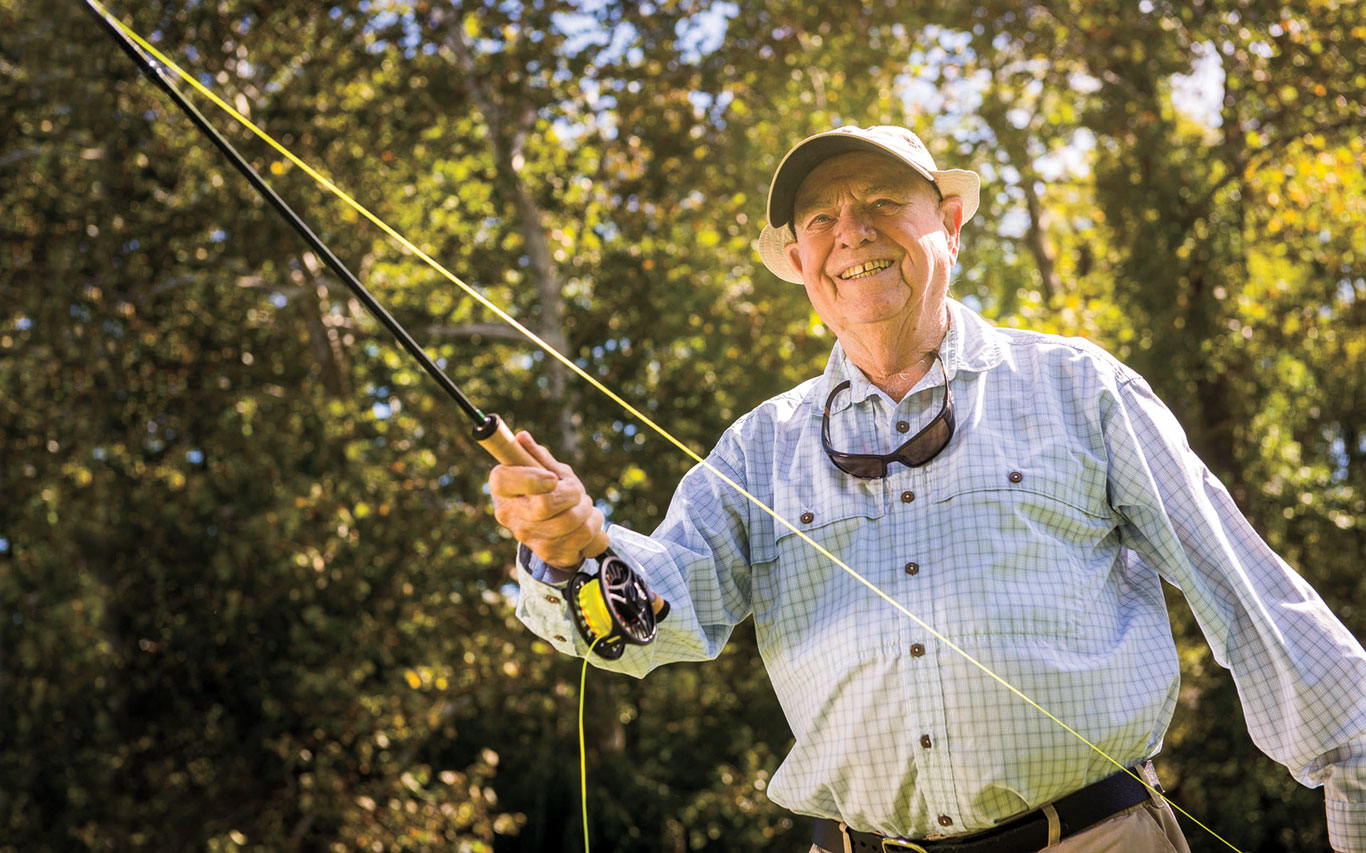The richest of the various veins of sporting literature almost certainly is that devoted to angling in general and particularly fly fishing.
It has a long, venerable history, dating all the way back to Dame Juliana Berners late 15th century work, A Treatyse of Fysshynge with an Angle; continuing through the most heralded of all fishing books, Izaak Walton’s The Compleat Angler; and emerging in glorious full-fledged fashion in the latter part of the 19th century. Books in the field continue appearing at an impressive pace. All types of sport fishing are served, and served increasingly well, with interesting, informative, and in many instances immensely readable works.
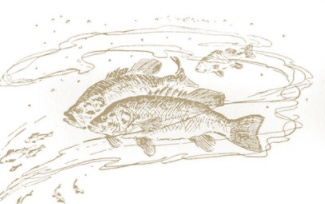 Some of these belong to the traditional “how to” and “where to” genres. Such works undeniably have their place, but when it comes to pure reading pleasure meditative treatments, “Me and Joe” coverage, or simple storytelling get the nod from this reviewer. For the sake of transparency, it probably should be noted that two of the three books I have personally written on fly fishing fall into the “how to” category while a third, albeit only in part, is of a “where to” nature. All did well and in some ways the third one, Fly Fishing in the Great Smoky Mountains National Park: An Insider’s Guide to a Pursuit of Passion, gives me more satisfaction than any of my books. That is quite possibly because it includes a good deal of history, personal reminiscence and anecdotal information. Still, when I get comfortably snuggled into an easy chair during the winter or relax in the shade or beneath a fan in warmer months, give me what is often described as a “read” book for my cherished leisure hours.
Some of these belong to the traditional “how to” and “where to” genres. Such works undeniably have their place, but when it comes to pure reading pleasure meditative treatments, “Me and Joe” coverage, or simple storytelling get the nod from this reviewer. For the sake of transparency, it probably should be noted that two of the three books I have personally written on fly fishing fall into the “how to” category while a third, albeit only in part, is of a “where to” nature. All did well and in some ways the third one, Fly Fishing in the Great Smoky Mountains National Park: An Insider’s Guide to a Pursuit of Passion, gives me more satisfaction than any of my books. That is quite possibly because it includes a good deal of history, personal reminiscence and anecdotal information. Still, when I get comfortably snuggled into an easy chair during the winter or relax in the shade or beneath a fan in warmer months, give me what is often described as a “read” book for my cherished leisure hours.
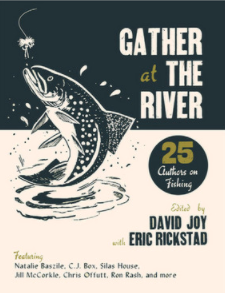 A bunch of books fitting that description have appeared of late, and here’s an overview of a quartet of them. As good a place to begin as any is with David Joy (Editor—with Eric Rickstad), Gather at the River (Hub City Press, 2019—paperbound, $18—ISBN 978-1-938235-52-8). This is a collection of 25 essays touching on a wide range of fishing experiences. The contributors weigh heavily on the literary side of the scale and most of them are better known in the worlds of fiction, poetry and serious literature than as sporting or outdoor scribes. C. J. Box, the acclaimed author of the series of adventure stories/mysteries featuring game warden Joe Pickett, would be an exception, as is Ron Rash, who draws heavily on his knowledge of the folkways of the southern Appalachians in his novels and short stories. Never mind what at first blush might seem to be high-brow material rather than well-told tales sure to grab the attention of the avid angler; this is a delectable book for the contemplative sportsman. The anthology forms a wonderful reminder of the words offered by the late Arnold Gingrich, a noted writer, devoted fisherman and one-time editor of Esquire, that “the fishing’s only part of it.”
A bunch of books fitting that description have appeared of late, and here’s an overview of a quartet of them. As good a place to begin as any is with David Joy (Editor—with Eric Rickstad), Gather at the River (Hub City Press, 2019—paperbound, $18—ISBN 978-1-938235-52-8). This is a collection of 25 essays touching on a wide range of fishing experiences. The contributors weigh heavily on the literary side of the scale and most of them are better known in the worlds of fiction, poetry and serious literature than as sporting or outdoor scribes. C. J. Box, the acclaimed author of the series of adventure stories/mysteries featuring game warden Joe Pickett, would be an exception, as is Ron Rash, who draws heavily on his knowledge of the folkways of the southern Appalachians in his novels and short stories. Never mind what at first blush might seem to be high-brow material rather than well-told tales sure to grab the attention of the avid angler; this is a delectable book for the contemplative sportsman. The anthology forms a wonderful reminder of the words offered by the late Arnold Gingrich, a noted writer, devoted fisherman and one-time editor of Esquire, that “the fishing’s only part of it.”
Here you’ll enjoy Rash paying tribute to boyhood days and brook trout in North Carolina’s Blue Ridge Mountains, join Box on Wyoming’s Encampment River in the middle of a green drake hatch and learn why he wants his ashes spread there (just as I want mine distributed on my home waters in the Smokies), share boats and fond memories of childhood adventures with several authors and experience the simple joys of the world of wonder that lie at the heart of all that is magical and meaningful in piscatorial pursuits.
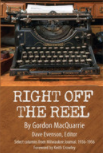 Moving from essays that sparkle because of being well-written, provocative or simply of a nature to motivate musing, we have a dandy selection from the newspaper columns of one of the giants of American sporting letters, Gordon MacQuarrie. The first individual in this country to hold a full-time newspaper position devoted exclusively to coverage of the outdoors (and I wonder if that special breed of scribe is now extinct, because I know of no such soul today), MacQuarrie is best known for his Old Duck Hunters tales. Yet he wrote on a wide range of hunting and fishing topics, basically reflecting the opportunities for outdoorsman living in his part of the world (Wisconsin). In Right Off the Reel (the reel refers to that of a manual typewriter, not a piece of fishing equipment— edited by Dave Evenson and with a Foreword by MacQuarrie biographer Keith Crowley), we have a collection of MacQuarrie’s tales stretching over the period from 1936 to 1956. All the little stories originally appeared in the Milwaukee Journal and are written in the folksy style once so common in the outdoor section of newspapers.
Moving from essays that sparkle because of being well-written, provocative or simply of a nature to motivate musing, we have a dandy selection from the newspaper columns of one of the giants of American sporting letters, Gordon MacQuarrie. The first individual in this country to hold a full-time newspaper position devoted exclusively to coverage of the outdoors (and I wonder if that special breed of scribe is now extinct, because I know of no such soul today), MacQuarrie is best known for his Old Duck Hunters tales. Yet he wrote on a wide range of hunting and fishing topics, basically reflecting the opportunities for outdoorsman living in his part of the world (Wisconsin). In Right Off the Reel (the reel refers to that of a manual typewriter, not a piece of fishing equipment— edited by Dave Evenson and with a Foreword by MacQuarrie biographer Keith Crowley), we have a collection of MacQuarrie’s tales stretching over the period from 1936 to 1956. All the little stories originally appeared in the Milwaukee Journal and are written in the folksy style once so common in the outdoor section of newspapers.
While the majority of the pieces, a whopping seven dozen in all, focus on hunting, there’s plenty of literary grist here for the fisherman’s mill. Trout, bass, pike and bluegill all figure in this sportsman’s pie, and to my great delight I even found a gem that had somehow had eluded me despite decades of research and writing on Archibald Rutledge, “Poet Rutledge Restores Historic Home, with Time Out for Hunting and Dogs.” Anything MacQuarrie wrote is worth reading and re-reading, and here we have what might almost be described as this staunch Wisconsinite’s “lost classics” (ISBN 13-978-1725812864. Paperbound, 220 pages. $18 from the publisher, Barnes Area Historical Association—BAHAmuseum.org).
As earlier mention of Dame Juliana Berners makes manifest, women have always participated in and enjoyed fishing. My mother, never mind that her angling prowess set an incredibly low standard or that she “lost” the first bluegill I ever caught by stowing it beneath a rock little if any bigger than the diminutive panfish, was seldom happier than on those rare occasions she got to go fishing. Catching abilities aside, she more than made up for her deficiencies on that front through absolute wizardry when it came to cooking fish, and she would have loved the entire concept underlying Steven Kantner’s Fifty Women Who Fish (Hardbound, www.wildriverpress.com or 425-486-3638—314 pages, $59.95).
Unlike the two previous books, which are inexpensive paperbacks, this is a big, sumptuous work of coffee table dimensions and appearance. There are fetching color photographs, along with a smattering of black-and-whites in abundance, and in many senses, this is a work dominated by photography rather than prose. Still, the vignettes of the 50 lady anglers are nicely done and, judging by the coverage of one of those profiled whom I happen to know pretty well, the first lady of angling, Joan Wulff, they are spot on in terms of capturing personality.
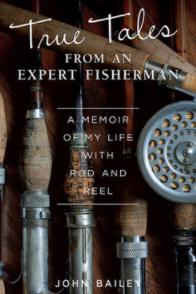 Finally, in True Tales from an Expert Fisherman: A Memoir of My Life with Rod and Reel (ISBN 978-1-5048-0087-7, paperbound, distributed in the United States by Fox Chapel Publishing—www.FoxChapelPublishing.com, $19.99), we have a delectable collection of 10 tales from John Bailey, a major figure on the British fly-fishing scene. The stories are essentially stand-alone pieces, spreading across the globe from Nepal to the author’s home waters in Norfolk, from Mongolia to Greenland; and across species from carp to char, barbel to gold mahseer. This is travel writing at its best for those of us who revel in vicarious pilgrimages to streams of dreams. Bailey is at least as well known for his photography as he is his writing, and dozens of color images, many of them striking, spice this book’s 216 pages.
Finally, in True Tales from an Expert Fisherman: A Memoir of My Life with Rod and Reel (ISBN 978-1-5048-0087-7, paperbound, distributed in the United States by Fox Chapel Publishing—www.FoxChapelPublishing.com, $19.99), we have a delectable collection of 10 tales from John Bailey, a major figure on the British fly-fishing scene. The stories are essentially stand-alone pieces, spreading across the globe from Nepal to the author’s home waters in Norfolk, from Mongolia to Greenland; and across species from carp to char, barbel to gold mahseer. This is travel writing at its best for those of us who revel in vicarious pilgrimages to streams of dreams. Bailey is at least as well known for his photography as he is his writing, and dozens of color images, many of them striking, spice this book’s 216 pages.
These four works, diverse in nature but all bearing the common hallmark of offering excellent reading, indicate that the long thriving genre of angling literature remains as solid as ever. That’s a comforting thought to have in mind as you settle down for a spate of relaxing reading, which comes as a welcome substitute for being out and about with a rod in hand. These books will form welcome additions to any angling bibliophile’s collection.
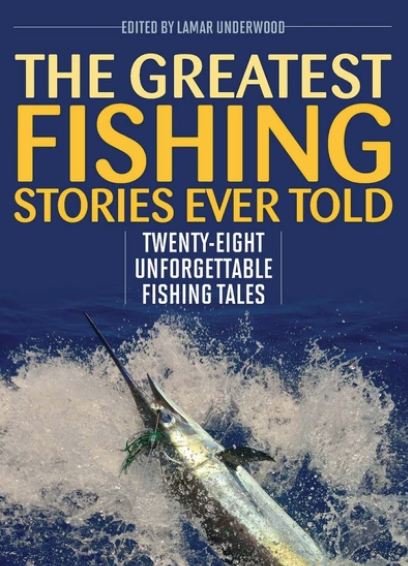 The Greatest Fishing Stories Ever Told is sure to ignite recollections of your own angling experiences as well as send your imagination adrift. In this compilation of tales you will read about two kinds of places, the ones you have been to before and love to remember, and the places you have only dreamed of going, and would love to visit. Whether you prefer to fish rivers, estuaries, or beaches, this book will take you to all kinds of water, where you’ll experience catching every kind of fish.
The Greatest Fishing Stories Ever Told is sure to ignite recollections of your own angling experiences as well as send your imagination adrift. In this compilation of tales you will read about two kinds of places, the ones you have been to before and love to remember, and the places you have only dreamed of going, and would love to visit. Whether you prefer to fish rivers, estuaries, or beaches, this book will take you to all kinds of water, where you’ll experience catching every kind of fish.

